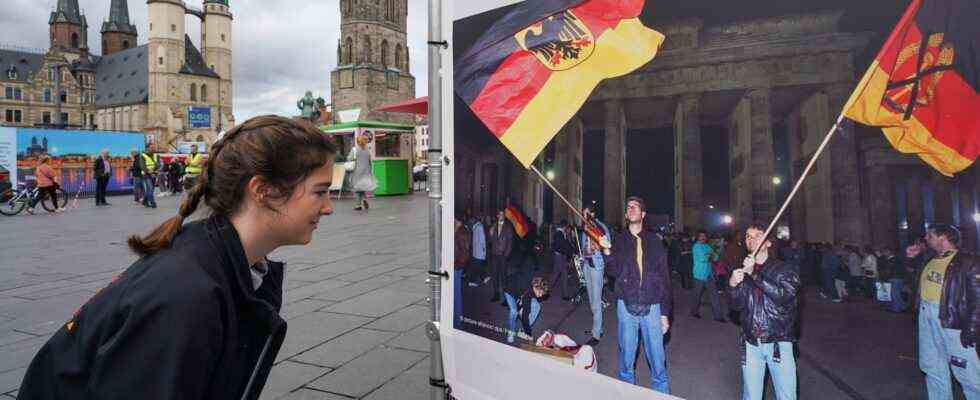interview
Status: 03.10.2021 09:39 a.m.
Material prosperity, freedom rights: For most people in East Germany, the great expectations of reunification have been fulfilled, says social scientist Kollmorgen. Nevertheless, there remains frustration and skepticism.
tagesschau.de: On October 3, 1990, German unification was completed. After the fall of the Berlin Wall in 1989, many GDR citizens took to the streets for reunification. What expectations, what hopes were associated with it?
Raj Kollmorgen: From the perspective of the majority, I would say: there was great hope for material prosperity, of course with a view to the level of prosperity in the West. And a lot of people thought that it would be enough if they continued to work hard and adjusted to the market economy. Because actually they are so far and so modern in their companies and with their own labor that it hardly means a break. Politicians suggested that to them at the time.
There were also those who wanted to secure the freedoms that had been fought for during the peaceful revolution. They weren’t quite sure whether democratization could be sustained within the framework of the GDR. And then of course there were many who stuck to this wish for reunification from the perspective of a German nation. And who wished that they could visit their relatives and friends and travel freely without bureaucratic hurdles.
But many East Germans have also seen that it is something like a deal. That on the one hand you give up your independence as a GDR and GDR society and receive material prosperity in return.
To person
Raj Kollmorgen was born in Leipzig and is a social scientist at the Zittau / Görlitz University of Applied Sciences. His main research interests include social change, post-socialist transformations in Eastern Europe and German unification. From 2019 to 2020 he was a member of the Federal Government’s Commission “30 Years of Peaceful Revolution and German Unity”
tagesschau.de: What has been met of these expectations – and what has not?
Kollmorgen: The expectations of a secure and liberal order of freedom and justice have been fulfilled for most of them. With the small caveat that when it came to property rights, professional rights or tenancy law, it became clear that there will also be hardships, which will definitely influence the awareness of the successes or failures of German unity.
As far as material prosperity is concerned, one has to say quite objectively: this has been magnificently fulfilled. But it depends on how people see and judge it. And there is the problem of the comparison with the old federal states, which are not seen as a whole. Most East Germans look at examples like Hamburg-Blankenese and Konstanz, that is, the richest sections of the population and the richest and most beautiful neighborhoods and cities. And then many East Germans still feel underprivileged to this day.
tagesschau.de: How has the satisfaction of the people in the former GDR developed and how is it now?
Kollmorgen: A basic trend can be described: According to this, satisfaction has increased despite the many debates about the success of the unit, about “second-class citizens” and about AfD election results. The East Germans as a whole were never more satisfied than they are now. At least until 2019, until the pandemic.
At the same time, however, you can clearly see the collapse in life satisfaction as soon as there were crisis phenomena: at the beginning of the 1990s with the Treuhand, in the 2000s with Agenda 2010 and the Hartz IV laws or during the migration crisis.
But overall there was more of an upward movement, which contrasts so irritatingly with the election results of the parties that expressly see themselves as critical of the system.
“A kind of fallacy”
tagesschau.de: How then do these election results come about?
Kollmorgen: The problem is initially a kind of fallacy. Because you can see your own good situation, but always think that others are worse off. You also ask yourself what the future holds and what you influence with your voting decision. Is it going in the right direction? And so people say, although they are doing relatively well themselves: I am afraid that I will lose the material standard of living that I have now, my position, status, reputation.
Then there are the dramatic upheavals that many people have experienced themselves. There was a lot of frustration and skepticism up to a mistrust of the Federal Republican elite and the institutional system. At the same time, East Germans miss the West Germans’ respect for what they achieved during the GDR era and for what they had to suffer and achieved during the tough period of transformation. This lack of respect plays a role for many East Germans to this day, including the – at least in their eyes – misperception that the East is just a stronghold of brown movements, brown parties and otherwise needy people who actually cannot get on their feet and therefore still need transfer payments today.
tagesschau.de: What has to happen so that people in East Germany really feel “reunited”?
Kollmorgen: A large majority – around 80 percent – feel integrated and reunited. That is why I would ask the question differently: How can you get what is still divided between East and West, where there are differences and differing views, how can you go one step further?
tagesschau.de: And your answer?
Kollmorgen: If people in the East can reflect on their strengths and develop and develop self-confidence, then there is also a unity in the difference and plurality of living conditions. And for me that is something like the ideal image. And yet of course it remains true that we have to be careful that heterogeneity does not mean division or that it turns into division.

